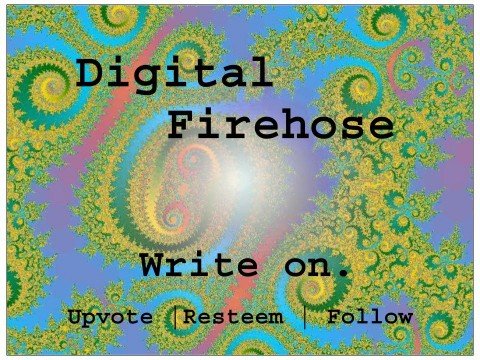
For much of my life, I've never really thought of myself as an anarchist. But in the last year or so, as I read about anarchism on Steemit and elsewhere, I have found a great deal of alignment in my own philosophy and that of anarchy, or for some, voluntaryism.
It is important to know that anarchy is not a life without order. It is a way of life without rulers. There are still rules, just no rulers. The rules are set by the people and they are enforced by reputation. People tend to prosper in anarchy with good reputations. This concept goes against everything that I've been taught in school, so I publish this article with a bit of trepidation.
I have a few basic rules that I follow in life. The prime directive, the overarching rule that I follow, above everything else, is to err on the side of peace. I strive to err on the side of peace. I'm not trying to be perfect here, I only aim for progress with every interaction I have with other people. I make a conscious effort to do this every day, and I can honestly say that I live a life of relative peace and quiet as a result of that effort. You could even say that I'm "happy".
People suffer enough by their own hand, so I have no need to add to their pain. Before I speak or do anything in response to someone else, I try to err on the side of peace. I test what I'm about to say or do in my mind to see if it is truly peaceful.
This part of my philosophy, to err on the side of peace, would be in line with the non-aggression principle of anarchy. In anarchy, the use of force must always be justified. If not justified, it must be withdrawn or set aside for a better means to keep the peace and resolve disagreements.
Another rule that I follow is this: If you show up, I show up. This is how I am with friendships, relationships and everyone I know. I know the sorrow of unrequited love. I know the discomfort of a friend who does not return my calls, respond to my emails or to show up for lunch or a movie. I am a strong believer in reciprocation and that is how I base my relationships with everyone.
This "show up" rule is voluntary. If you don't show up, I won't track you down to get you to show up. It's your call, your decision. I only sent the invite, not the sheriff. This rule is also inline with voluntaryism, in the sense of freedom of association.
I am neutral in all of my affairs. I am not for or against much of anything, except when it comes to peace. I value peace in my house, peace in my neighborhood, and peace in my heart and mind, more than anything else. In most of my political discourse, I use neutral language, keep it factual and use the word to advance something, rather than to take something or someone down. I make positive, affirming statements.
I avoid entanglements with others, too. This isn't to say that I didn't get married. I did. I mean to say that I look for purpose in every relationship and stick to it. Every relationship has a function for me, from satisfying a need for affection and companionship, to intellectual curiosity and industry. You can hear it in my voice, too. I sound different when I talk with my mother than when I talk with my supervisor at work. I respect the context of my words just as much as the words themselves.
People who know me well also know that I'm deeply political, but not in the conventional sense. I'm not interesting in winning or making other people lose. I'm interested in peace.
So I follow another rule: my morality comes from my chest and my gut. If I don't like the way that I feel after I do something or say something, I stop doing that, reflect on it, and do something else the next time that situation comes up again. I avoid making statements that require other people to change. I let people know how I feel. I change my behavior in response to others rather than try to make them change because it is just not possible to change people. I can only put my message out there to see what they do. I don't ask people to change because that gives them power that I don't really want to give anyway. I even tell my kids, "You don't have to change for me. Change is automatic," as acknowledgement that as they grow up, they will change.
I think it is worth noting here that I'm not a libertarian. I have studied libertarianism and I see it as just another front for business. This is especially unsettling when the art of American business seems mostly concerned with capturing their market by setting it at a political disadvantage with respect to the business. So, no. I'm not a libertarian.
I came to the conclusion that I'm an anarchist by performing a simple mind experiment. I'm driving down the road. How often do I really think about the laws? When I see the speed limit sign. Otherwise, I drive at a rate of speed relative to my comfort level. I keep my distance from other cars relative to my level of comfort. I respect the space of other drivers.
I then considered my relationships with other people. In most day to day interactions with other people, I'm not thinking of the laws, Donald Trump or Congress. Generally, I operate without regard to the laws, rather, I operating with regard to my sense of empathy for others. I operate with a sense of reciprocation with others. I suppose you could say that I'm operating more along the lines of mores and customs, but those rules are built voluntarily, and they vary by region and culture.
As I read on the history of voluntaryism, I could not help but notice that voluntaryism arose in response to the church exercising the power of taxation through government for support of that very same church. Voluntaryism is a response to religious oppression. As I read that history, I considered again, the threat of letting the church get their hands on the levers of power in the Trump Administration (just think, Besty DeVos). On the other hand, current events may be just what is needed to raise awareness of an alternative to government, self-government. Voluntaryism by its very nature distributes power far and wide, to allow for freedom from religion and freedom of religion.
I don't have a problem with religion as a means of maintaining a conscious contact with a creator. I do have a problem with religion as a means of social control because "social control" implies "political control".
I believe that true anarchy is a possibility for humanity. I share a certain disdain for rulers and leaders as anarchists do. I find that in our history, power corrupts and absolute power corrupts absolutely. The leaders we have in America have traded true leadership for the worship of money, and that is a corrupting influence. The corruption we see in America is a direct result of concentration of power.
While I believe that anarchy is a possibility for humanity, I also believe that there is a lot of work we must do on ourselves and our progeny to make it work. Think again about what I said earlier today, about corruption and American business. What gives people the idea that they should have power over any other person?
Our parents. If our parents abuse us, they are exercising power without justification. If that is all we have ever known, we grow up to believe that might is right. We may grow up believing that it is OK to bomb small countries, take their natural resources on the cheap or outright steal them, and kill entire states in those small countries. We may grow up to believe that the exercise of power is justified by the color of our skin. We may grow up to believe that our religion, our church is superior to all others, and that we have a right to compel others to join God's MLM. We may grow up believing that we should pass all that on to the next generation.
I believe that anarchy for humanity becomes a very real possibility when we have raised an entire generation of kids without aggression, without violence, without coercion. I just can't see any other way to do it. I'm not saying that it is impossible, I'm saying that in order to have a culture that exercises power without aggression, violence or coercion, that culture must follow the principles of non-aggression as a way of life, and that includes parenting.
Maybe that won't happen in my lifetime. Maybe it will. But for now, I will just keep doing what I'm doing. I will continue to err on the side of peace, and see what happens next.


A basic guaranteed income in the context of Maslow's Hierarchy of Needs
A sort of political movie review: Star Wars: Rogue One
Happiness isn't getting everything you want - happiness is a skill
The opposite of love is not hate, it is apathy
Fate, impunity and altruism
Guessing you started on the left, politically?
Downvoting a post can decrease pending rewards and make it less visible. Common reasons:
Submit
I've been left and right. Now I'm just the peace party.
Downvoting a post can decrease pending rewards and make it less visible. Common reasons:
Submit
The problem I have with peace, is that it can be found in abject servitude.
Downvoting a post can decrease pending rewards and make it less visible. Common reasons:
Submit
So can war. Many people have found themselves in abject servitude during and after war.
I suppose then, that it's a matter of personal preference.
Downvoting a post can decrease pending rewards and make it less visible. Common reasons:
Submit
@digitalfirehose Thanks for the post. I wonder what your outcome on this test is.
This is my result:
Downvoting a post can decrease pending rewards and make it less visible. Common reasons:
Submit